Magnum octopus
Rachel Walker discovers that the apparently exotic octopus is actually native to our shores: abundant, delicious, yet historically curiously under-used here, this delicacy is now becoming more popular as Britain’s home cooks get ever more adventurous.
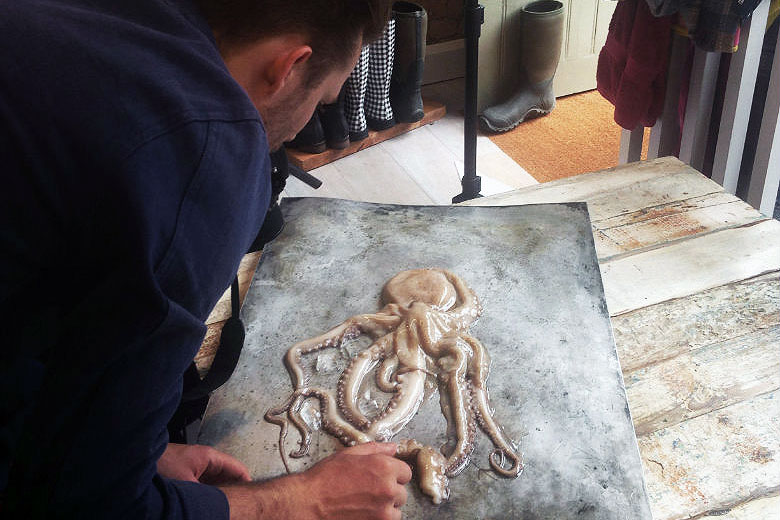
My first encounter with an octopus was in East London, 40 miles from the sea. I was at a cookbook shoot, when an octopus was brought out, its shimmering, dusky pink skin looking particularly photogenic against a grey metal background (pictured above).
When the shoot finished, the leftovers were divvied out, and I couldn’t have been quicker to offer the octopus a home. I was surprised to discover the suckers on the tentacles still had suction and that, as I lowered it into a tupperware, the octopus’ shape shifted – acting more like a liquid than solid – to fill the tub. And so I popped it in my handbag and merrily trotted home. Thus began my experimentations with octopi. This first octopus seemed incredibly exotic. I reached for my cookbooks and scoured Italian polpo recipes and Japanese dishes using tako. I read how Mediterranean fishermen would beat an octopus against rocks to tenderise it, while French chefs would massage it and believed that cooking an octopus in copper helped tenderise the flesh.
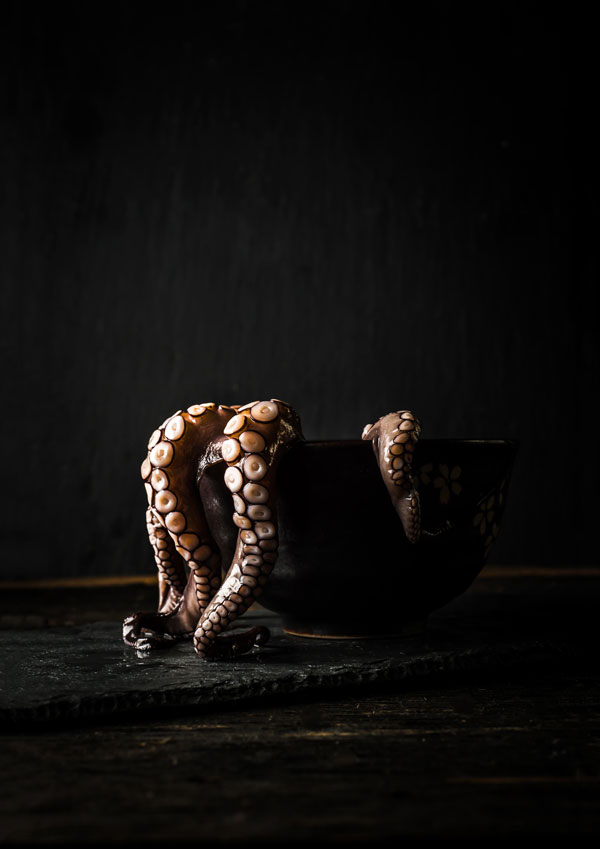
As I read more, I was surprised to learn that the octopus isn’t actually as exotic as I first thought. There are two native species: a larger and rarer variety (Octopus vulgaris) and a smaller, curled octopus (Eledone cirrhosa), distinguished by a single row of suckers along its tentacles (rather than two), which is particularly plentiful off the Cornish coastline.
Contrary to what you might think, finding octopus in our waters is not a new phenomenon, brought about by rising ocean temperatures (although that has been a contributory factor to the proliferation of cephalopods worldwide over the past 50 years or so, according to recent research). In 1899, vast plagues of octopus invaded the south coast of England and started devouring local shellfish stocks. “Desperate fishermen would catch tonnes (literally) of the animals and dump them on local fields for use as a fertiliser,” write Chambers and Sowerby in their British Seashells: A Guide for Collectors and Beachcombers.
In the mid-1960s, a couple of particularly cold winters saw octopus numbers plummet, but with a record 529 tons landed in 2013, stocks are back up again. Andrew Wheeler, assistant to the chief executive of the Cornish Fish Producers Organisation confirms the increase, saying that he’s certainly seen more being landed over the past few years.
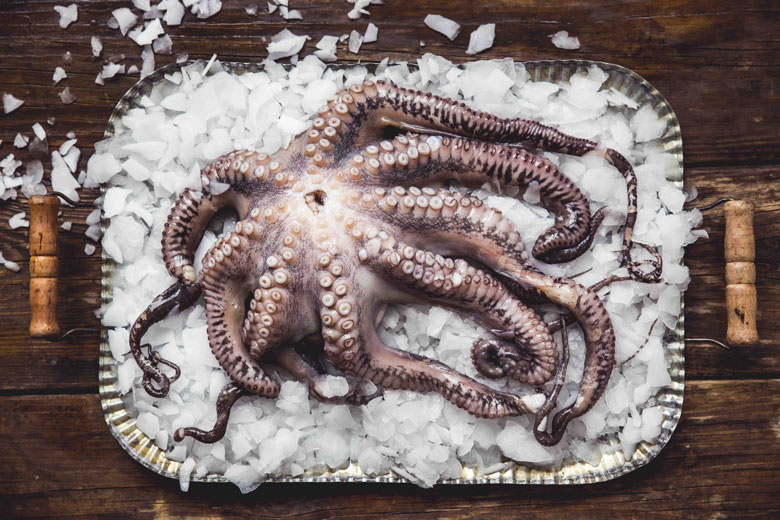
“Beam trawlers catch a fair bit, because a market does exist – but octopus still doesn’t command as high a price as squid or cuttlefish,” he says. He’s long been a convert, however. He explains how a trip to Greece, where he ate many delicious local oktapodi dishes, inspired him to start cooking the native variety back home. Last year, octopus braised in wine and herbs took pride of place at Christmas lunch. “It made a nice change from turkey,” he laughs, “and it was delicious.”
Interestingly, although the octopus has been native to Britain for centuries, it hardly features in our culinary heritage. Japan has octopus sushi, and Korea has controversial octopus sashimi (sannakji); there are Mediterranean octopus stews, and Greek pickled octopus (xtapodi toursi). CJ Jackson, CEO of the Billingsgate Seafood School, recognises that the cephalopod is often overlooked in Britain. “We cook it a lot at the school, because it’s such an underutilised choice.”
Why that should be is a mystery. Octopus is a good low-fat source of protein and is rich in vitamin B12, which helps maintain healthy skin and hair. It’s also pretty cheap – around £6/kg – as well as being readily available in good fishmongers. CJ confirms it’s readily available at Billingsgate Market both fresh and frozen. The frozen supplies come mainly from Spain, formed into a solid ball after being tenderised by an industrial tumbling process.
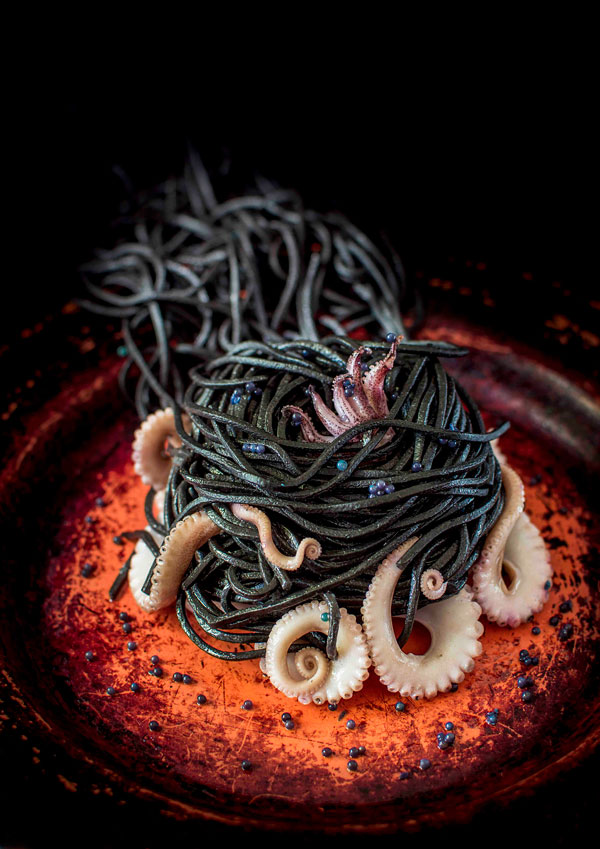
Though tumbling, or indeed whacking an octopus against rocks, will make the flesh more tender, cooking it carefully works just as well. The key is to do so either very quickly or very slowly. Either throw it on a searing hot grill, or gently simmer it for at least an hour – anything in between will make the flesh tough and rubbery.
The proliferation of cookbooks charting international cuisines means there’s more direction for home cooks than ever. For example, Sabrina Ghayour’s Sirocco features a recipe for chargrilled octopus with maple chilli dressing and pistachios, while José Pizarro’s Basque offers grilled octopus with peppers and aubergine.
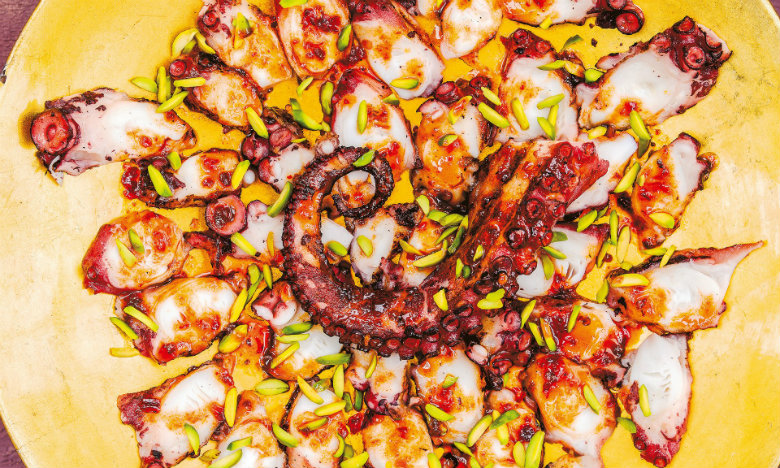
Growing British culinary interest in octopus has sparked greater demand at fishmongers. “Traditionally, our Spanish, French and Italian customers would buy octopus,” says Brendan Moore of Jonathan Norris, a fishmonger in East London. “But recently, we’ve had a lot more British and Irish customers requesting it. As a nation we’re definitely becoming more adventurous in the kitchen.”
Octopus might not have featured in Britain’s culinary tradition to date, but perhaps that’s starting to change. Who knows, with more open-mindedness and more experimentation in home kitchens, in a few years perhaps Cornish Octopus will sit alongside Fal Oysters, Scottish Salmon or Isle of Mann Queenies as an officially recognised regional delicacy.





